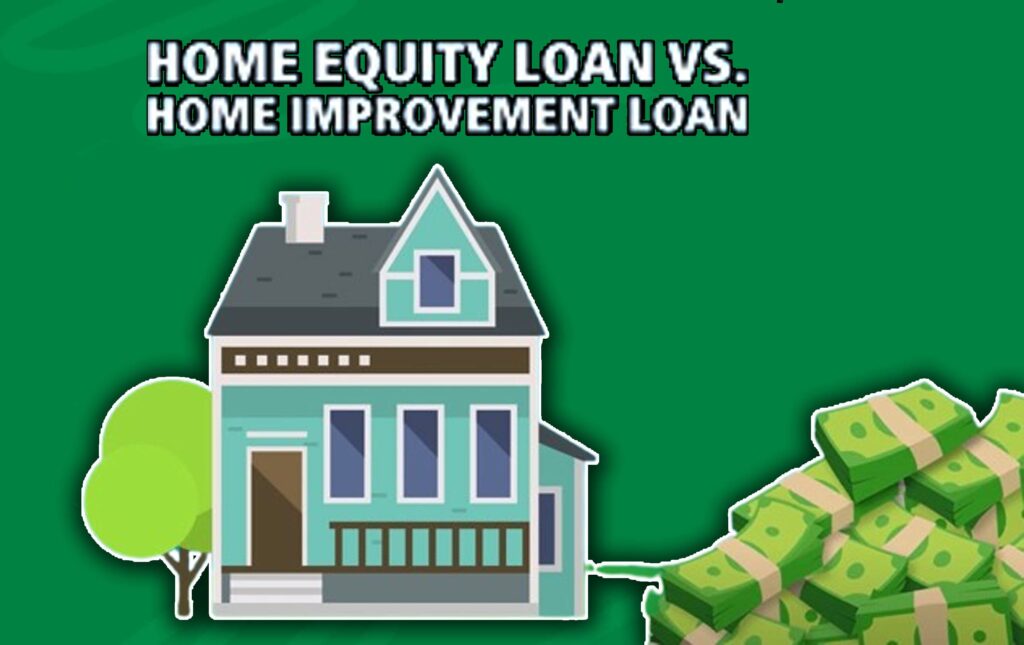Home Improvement Loan vs. Home Equity Loan: Which is Better – Beginning a home improvement project can be thrilling, especially if you want to improve your outdoor living space, renovate your kitchen, or add a new bathroom. However, financing these projects can be daunting, and homeowners usually find themselves in a pickle, considering which option will work better for them between home improvement loans and home equity loans.

Home improvement loan vs. home equity loan: which is better? Both loan options have their unique advantages and disadvantages, and making the right decision. This is why this blog post will help you understand the complexities of each loan type better by comparing the benefits, features, and situations they are ideal for.
What is a Home Improvement Loan?
A home improvement loan is a form of personal loan designed specifically to offer assistance when it comes to remodeling projects or home renovation. Home improvement loans are usually unsecured; therefore, collateral is not required, unlike home equity loans, which are secured by the equity in your home.
What Does It Cover?
What can you use a home improvement loan for? Here are the many purposes to take out or apply for this loan type:
- Exterior upgrades.
- Interior renovations.
- Appliance upgrades.
- General home repairs.
- Energy efficiency improvements.
- Cosmetic enhancements.
- Structural repairs.
- Safety and security enhancements.
- Accessibility modifications.
- Room additions.
Pros and Cons
Here are the benefits and drawbacks of a home improvement loan:
Pros
- Fixed interest rates.
- No equity required.
- Streamlined application process.
- Quick approval.
- Tax deductibility.
- Suitable for small to medium projects.
- Multiple lender options.
- Flexible loan amounts.
- No appraisal necessary.
- No risk to home.
Cons
- Personal credit impact.
- Higher interest rates.
- Prepayment penalties.
- Lower loan limits.
- Not ideal for major projects.
- Challenging eligibility criteria.
- It is unsecured.
- Fees and charges.
- Risk of overborrowing.
- Limited repayment terms.
When to Take Out a Home Improvement Loan
Here are the most suitable situations to consider a home improvement loan:
- For smaller to medium-sized projects.
- If you do not have enough home equity to apply for a home equity loan.
- Have plans to increase resale value before selling it.
- Having a stable income and good credit gives you access to favorable loan terms.
- If you prefer not to use your home as collateral.
- When you require fast funding for urgent home renovations or repairs.
- For projects improving home value and enhancing livability.
- For energy-efficient upgrades.
- When you want stable monthly payments with a fixed interest rate.
When Not to Take Out One
It is not a good idea to apply for a home improvement loan if:
- For projects that will not boost home value or functionality.
- If you need a large sum of money that surpasses your home improvement loan limits.
- If you are not comfortable taking on debt or borrowing for home improvements.
- If you are moving soon.
- When you have enough home equity for lower interest rates.
- For temporary or cosmetic improvements or adjustments that do not have a lasting impact.
- When you are not sure about on-time loan repayment.
- Have an existing debt.
- When expected income or expense fluctuations affect loan payments.
- When there are better financing options available.
What is a Home Equity Loan?
A home equity loan, often called a second mortgage, allows homeowners to borrow against the equity in their property. Equity represents the difference between the home’s market value and the outstanding mortgage balance.
What Does It Cover?
Here are the different purposes you can use a home equity loan to cover:
- Emergency expenses.
- Debt consolidation.
- Investment opportunities.
- Vacation expenses.
- Major renovations.
- Personal projects.
- Business ventures.
- Education expenses.
- Wedding expenses.
- Medical expenses.
Pros and Cons
Here are the pros and cons of considering a home equity loan:
Pros
- Tax deductibility.
- Lower interest rates.
- No restrictions on use.
- Higher loan amounts.
- Potential for value appreciation.
- It is secured.
- Longer repayment terms.
- Fixed interest rates.
- No prepayment penalties.
- Flexible use of funds.
Cons
- Closing costs.
- Risk of foreclosure.
- Risk of overborrowing.
- Connected to home value.
- Limited availability.
- Long approval process.
- Requires equity.
- Potential fees for early repayment.
- Reduces equity.
- Variable interest rates.
When to Take Out a Home Equity Loan
You can consider a home equity loan if:
- If you can make timely repayment and understand the associated consequences.
- When you have a stable income and good credit, for better terms.
- If you want to consolidate high-interest debts.
- Looking forward to tax benefits.
- For projects that improve home value and livability.
- When you have a strong plan and understand the risks.
- Need long-term financing benefits.
- When you require a substantial amount for major expenses such as education, debt consolidation, or home improvements.
- Want fixed payments and predictable rates.
- If you have enough home equity.
When Not to Take Out One
It is not a good idea to apply for a home equity loan for any of these purposes:
- For short-term expenses.
- If the fund is for non-essential expenses.
- If you do not have sufficient home equity.
- When you have existing debts.
- If you are unsure about monthly payments.
- If you plan to sell the house soon.
- For high-risk investments with unpredictable returns.
- If you are not comfortable with home collateral and the risks involved.
- If there are better alternative options.
- When you can afford the closing fees.
Home Improvement Loan vs. Home Equity Loan: Which is Better?
Here is a table showing the differences between a home improvement loan and a home equity loan if you want to find out which one will work better for you:
| Aspect | Home Improvement Loan | Home Equity Loan |
| Approval Speed | Quicker | Longer |
| Loan Amount | Lower maximum loan amounts | Higher maximum loan amounts |
| Risk of Foreclosure | Home is not at risk | Home is at risk if your default |
| Collateral | Unsecured | Secured |
| Interest Rates | Higher | Lower |
| Equity Requirement | Not required | Requires equity |
| Tax Deductibility | Might be tax-deductible depending on the project and location | Might be tax-deductible depending on the loan’s purpose |
| Repayment Terms | Shorter | Longer |
| Eligibility Criteria | Easier | Stricter |
| Use of Funds | Restricted Use | Multi-purpose |
Since you are aware of the advantages and disadvantages of these loan types, you will know which loan will work better for your project.



